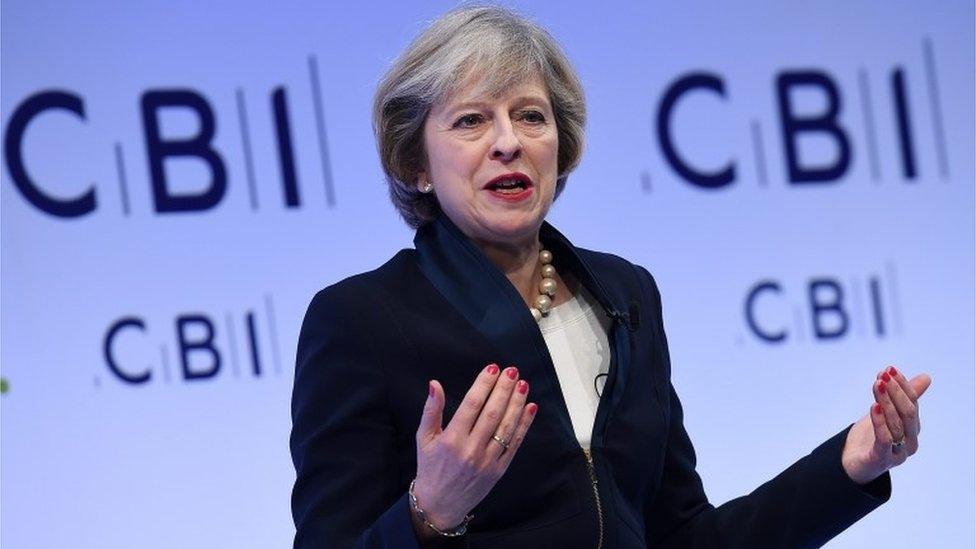Business leaders challenge Theresa May's pay proposals
- Published
- comments

At the CBI conference on Monday Theresa May said she still wanted to see some form of worker representation on company boards
Theresa May's attempt to reform corporate pay and governance faces more challenges from business leaders.
A report by the Big Innovation Centre, external rejects holding annual binding votes on pay and the publishing of pay ratios between chief executives and workers.
The two ideas were among the prime minister's suggestions to address public unease about executive pay.
This week, Mrs May was forced to reject claims she had watered down plans to put worker representatives on boards.
'Rebuild trust'
The prime minister set out her intention to strengthen corporate governance when she came to power in the summer. But some proposals have drawn criticism.
Friday's BIC report - whose contributors include Kingfisher non-executive director Clare Chapman - argues that action on pay is certainly needed to change executive behaviour and "to rebuild trust".
But the report says that binding votes and pay ratios are the wrong way to do it, and would damage efforts to motivate and retain chief executives.
"Pay ratios do not lend themselves to valid comparisons between companies, even within the same industry," the report says. "Pay ratios may lead to pay being decoupled from performance."
And on the issue of binding votes, the report says: "Theresa May, in a speech prior to becoming Prime Minister, indicated that there should be binding votes on executive pay. This has been interpreted by some as annual binding votes on pay outcomes, and policy proposals have been prepared by at least one Member of Parliament on this basis."
The report argues that annual binding votes would be a "disproportionate response... and would be likely to have many negative unintended consequences".
Simpler pay
However, it says that if a company's pay policy receives less than 75% support from shareholders in two consecutive years, that vote should be binding. Currently, votes on executive pay are held every three years.
"It is less than 5% of companies that lose advisory votes," Ms Chapman told the BBC. "In the past year it was about 3% and so it is not a widespread market failure that we're trying to address here, it is ensuring that shareholders have got power to take actions where there are companies that are doing things that are not in the long term interests of shareholders.
"And so that's where I do think that the use of binding votes should be where advisory votes are lost," she added.
The BIC is backed by leading companies, academics and consultancy firms. Contributors to its research include Sir Andrew Witty, chief executive of drugs giant GlaxoSmithKline, Prof Alex Edmans, a corporate governance expert at London Business School, and Vincent de Rivaz, chief executive of EDF Energy.
Given the leading names behind the report, its recommendations will be seen as a powerful contribution to the growing debate on corporate governance reforms.
The recommendations include measures for "simpler pay structures". Instead of traditional performance-related pay and cash bonuses, the report calls for more use of share awards stretching over 5-7 years.
There should also be more transparency in how pay is set and more consultation with employees to explain how and why the remuneration is set, the report says.
- Published24 November 2016

- Published21 November 2016
